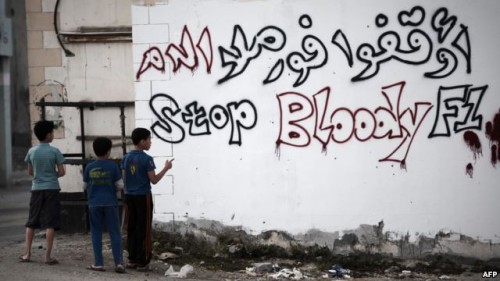Alwaght- Amnesty International called on Bahraini regime to "immediately and unconditionally" release opposition figures as Bahraini practice for Bahrain's Formula One Grand Prix began on Monday.
"Behind the fast cars and the victory laps lies a government that is tightening its chokehold on any remnant of dissent in the country by stepping up arrests, intimidation and harassment of political opposition, critics and activists," said Amnesty's MENA deputy director James Lynch.
"The alarming erosion of human rights in Bahrain in recent years means that anyone who dares to criticize the authorities or call for reform risks severe punishment," he said.
Bahrain, home to the US Navy's 5th Fleet and its old ally, has been scene of protests against the dictatorial Al Khalifa monarchy since 2011. Bahrainis are demanding more political freedoms and an end to the Al Khalifa dynasty.
Since then, dozens of people have been put on trial and handed lengthy jail terms in the Sunni-ruled kingdom over charges ranging from criticizing authorities to planning or carrying out attacks.
In March that year, troops from Saudi Arabia and the United Arab Emirates were deployed to the country to assist the Bahraini government in its crackdown on peaceful protests.
Scores of people have been killed and hundreds of others injured or arrested in the crackdowns.
Authorities have also revoked the citizenships of many Bahrainis -- a measure condemned by Amnesty again on Friday as an "unlawful" measure to "silence dissent."
The London-based rights watchdog urged Bahrain "to mark the Grand Prix by immediately and unconditionally releasing all prisoners of conscience held solely for peacefully expressing their views."
It named several influential opposition figures including Shiite opposition chief Sheikh Ali Salman, currently serving a four-year jail sentence for inciting disobedience, Sunni opposition leader Ibrahim Sharif, and Zainab al-Khawaja, who was taken to custody with her toddler after being convicted in 2014 for tearing up a poster of Bahrain's king.
"Other political opponents arrested in 2011 still remain behind bars," said Amnesty, adding that reforms introduced after the uprising "have demonstrably failed to live up to the hopes and promises they raised to protect and promote human rights."
The rights groups criticized Bahrain's ban on demonstrations in the capital, "lack of accountability of the security forces involved in killings, torture and other ill-treatment."
Tiny but strategic, the kingdom is connected to regional Sunni powerhouse Saudi Arabia by a causeway and lies across the Gulf from Shiite Iran.
Despite the crackdown on the 2011 uprising, protesters still occasionally clash with police in Shiite villages outside the capital Manama.



























